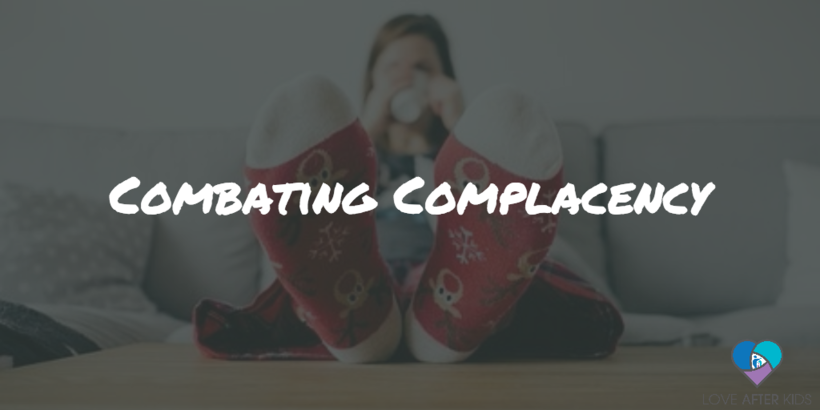Take a good look at your partner. Study their features. Take in their smell. Touch their skin and hair. Now close your eyes for a minute. Imagine they are no longer there.
That’s going to happen one day for one reason or another.
What if that day is tomorrow? Next week? Next month? In one year?
What would you do differently?
We don’t know when that day will come, but most of us live our lives and our relationships as though it never will.
That is complacency.
Complacency leads to regret.
Complacency makes us lose the color and see in black and white.
Complacency renders our partners two-dimensional.
Complacency sucks the life out of relationships.

Unfortunately, many will wait for an illness, a scare, or a loss to be stripped of the illusion of certainty and permanence, to be confronted with the ultimate truth of mortality.
Complacency and avoidance turn death into the elephant in the room that keeps getting fatter and fatter.

Does it have to be that way?
No. I don’t believe it does.
We can change our relationships with the illusion of permanence. Instead of something to run away from, it can serve as a constant reminder that we cannot take anything for granted.
Relationships are living things that often dry out and die before our physical bodies expire.
Why?
Because when relationships aren’t nurtured and fed they cannot survive.

What does it mean to nurture and feed a relationship?
To hug, hold, kiss, look, talk, share, listen, dance, argue…
These are all ways to feed a relationship, to maintain its elasticity.
In relationships, there will be inevitable resistance on the part of both individuals to return to the status quo.
Let’s look at an example of a fictitious couple, Bryan and Samantha:
Bryan and Samantha have two hours, on an average day, of time to themselves after putting the kids down. Bryan has gotten into the habit of going straight to Netflix. Samantha has gotten into the habit of going on Facebook and doing email. They go to their separate rooms to do their things and don’t take time to connect and talk. Part of what fuels this for Bryan is avoiding an argument. They were arguing a lot before and now that they aren’t talking much, the arguing has subsided. Part of what fuels this for Samantha is being fed up of being the only one to initiate contact. The more this pattern persists, the more it feeds their respective attitudes.
Breaking out of complacency is not a one and done type of thing. It’s a practice that needs to be cultivated.

The point of practicing mindfulness is not that you will never get distracted. It is an ongoing practice of getting distracted and bringing yourself back to the present. Mindfulness doesn’t exist without distraction.
The same is true for the practice of breaking the habit of complacency. It is an ongoing practice of acting on autopilot and taking back the controls. In other words, the goal is not to achieve a perfect state. Rather, the goal is to engage with the process.
Combating complacency, like mindfulness, is a way of life. Self-compassion is a critical component in both. If you expect that your mind will get distracted, because that is the nature of the mind, and that you will become complacent at times, and see the goal as dealing with it when it happens versus preventing it from happening, you are on your way to creating a more compassionate foundation.
CLICK HERE FOR UPDATES AND NEW POSTS
David B. Younger, Ph.D is the creator of Love After Kids, for couples that have grown apart since having children. He is a clinical psychologist and couples therapist with a web-based private practice, and lives in Austin, Texas with his wife, 12-year-old son, 3-year-old daughter and 5-year-old toy poodle.
Originally published at www.huffingtonpost.com on June 7, 2017.
Originally published at medium.com


